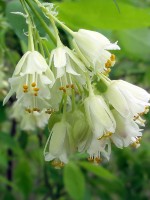Mon-Fri 9am - 5pm Mountain time
Royal Frost Birch vs American Bladdernut
Betula x Royal Frost
Staphylea trifolia
NOT AVAILABLE THIS SEASON - MIGHT RETURN
NOT AVAILABLE THIS SEASON - MIGHT RETURN
Royal Frost Birch is a beautiful, cold hardy tree. It features burgundy-red-purple foliage, turning a showy yellow-orange-red in fall. The attractive white bark is striking on a winter landscape.
Royal Frost Birch loves moisture. To meet this trees' moisture needs, try applying bark mulch over the root system. Keep in mind that this variety only likes to be pruned in summer to avoid “bleeding” sap.
The Royal Frost cultivar is popular for its upright pyramidal growth habit and fuller purple foliage.
American Bladdernut is a fast-growing, ornamental shrub native to eastern North America. It can be grown as a large shrub or trained as a small tree. The small, drooping, white flowers are bell-shaped and grow in clusters. They appear in mid to late spring, attracting various pollinators. Well suited as an understory plant as it prefers shady and partial sun location with moist soils.
The blossoms mature into papery seed capsules and have been described as miniature Japanese lanterns. They are commonly used in dried flower arrangements. The seeds found within the pods are edible, and have a taste similar to pistachios. They can be eaten raw, used in baking or made into a sweet cooking oil.
Care should be taken when planting American Bladdernut, as it can spread quickly. It is prone to suckering and will self-seed. Plant the right tree in the right place.

